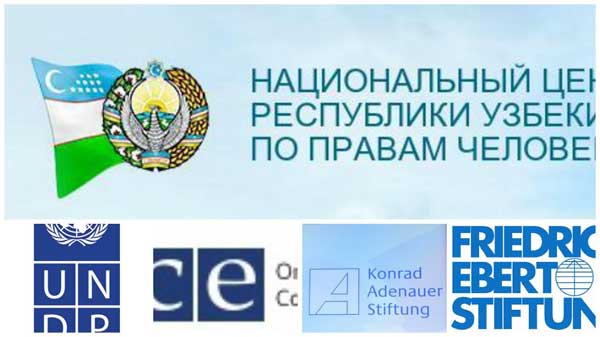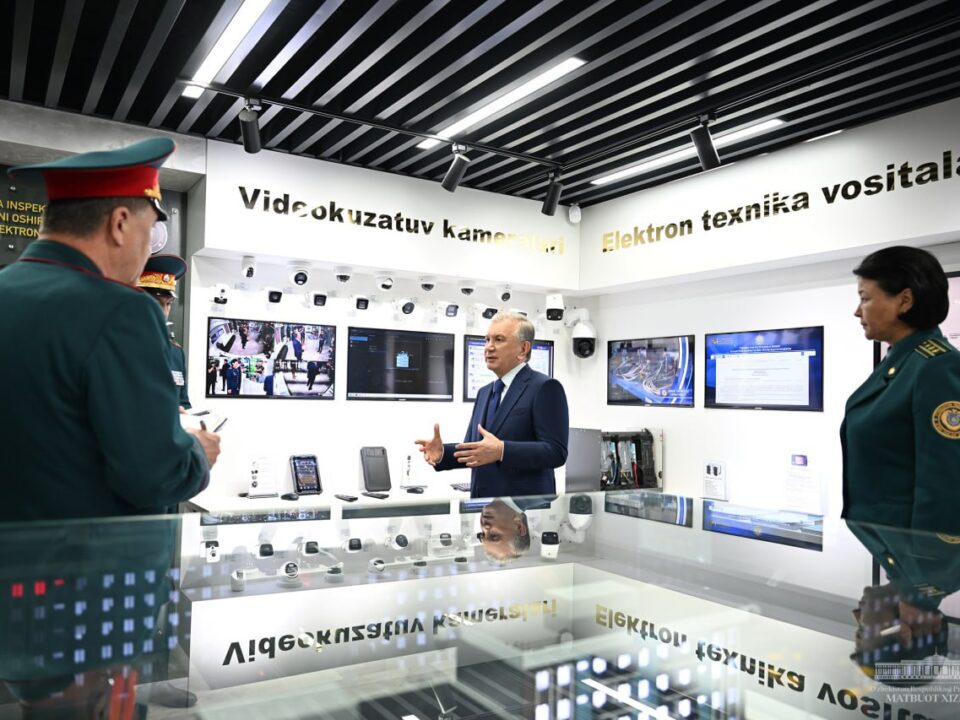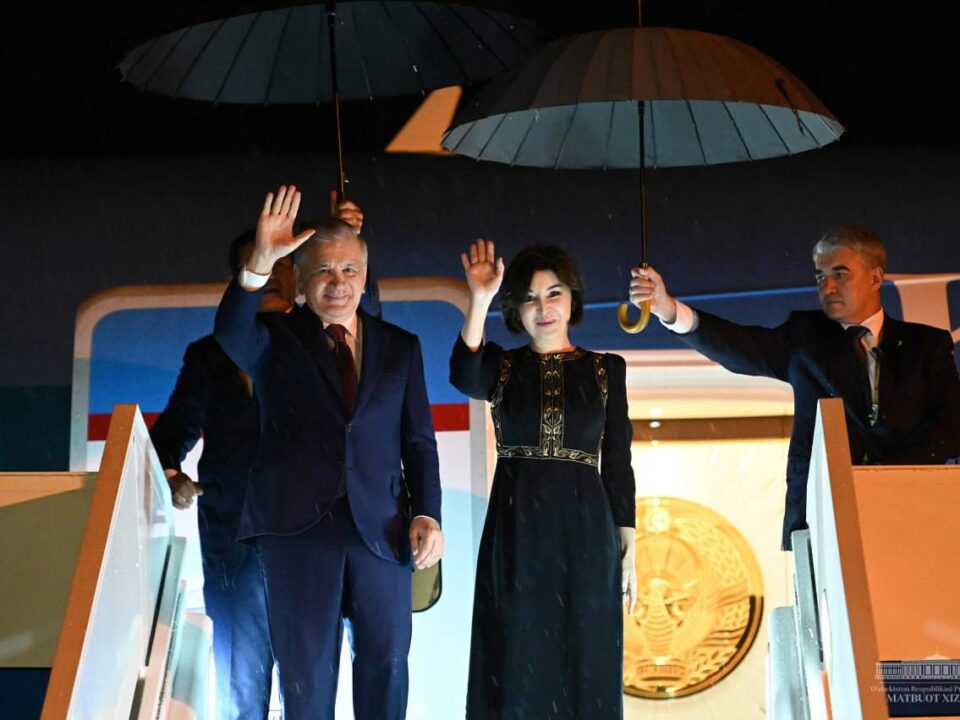Tashkent hosted international conference on the theme “Ensuring protection of the rights and freedoms – major direction of democratic renewal and modernization of country: experience of Uzbekistan”. National Centre for Human Rights in cooperation with UNDP, Office of OSCE Project Coordinator in Uzbekistan, Konrad Adenauer Foundation and Friedrich Ebert Foundation, Commissioner of the Oliy Majlis for Human Rights (Ombudsman), Ministry of Justice, General Prosecutor’s Office, Ministry of Internal Affairs, Research Centre of the Supreme Court, National Association of NGOs, Independent Institute for monitoring formation of civil society have been among organizers of the event.
Representatives of Office of UN High Commissioner for Human Rights, Venice Commission of Council of Europe, United Kingdom, Italy, Spain, Ireland, Romania, Scotland, China, Mongolia and other countries, members of Senate and Legislative Chamber of the Oliy Majlis, representatives of executive and judicial authorities, civil society institutions, legal academic community, educational institutions, media, international organizations and diplomatic corps have attended international conference.
In the course of conference participants reviewed national and international experience in the field of democratization of state power and control, consolidation of role of representative bodies in legislative process and parliamentary oversight as an important condition for ensuring rights and freedoms of citizens.
Those present had thorough exchange of views on further development of national human rights institutions, intensification of their cooperation with civil society institutions, as well as consolidation of social control and social partnership in the sphere of human rights protection.
Participants have paid particular attention to the issues of enhancement of judiciary and law enforcement agencies’ role in strong protection of human rights and freedoms, ensuring openness of public authorities’ activities, participation of media in this area. The experts have noted that universal human rights and freedoms constitute the conceptual basis of socio-political, socio-economic and spiritual life of society in Uzbekistan, form a constitutional platform of building democratic state of law and open civil society.
Relying on provisions, principles and purposes enshrined in the Constitution, the country has established a complete, efficiently operating legislative and regulatory framework, as well as deep-thought-out long-term program of reformation, democratization and liberalization of society, fundamental structural reforms and modernization of country, recognized today in the world’s as “Uzbek model” of development. This fundamental principle of ongoing large-scale reforms in Uzbekistan is a commitment to the postulate of “reforms, not for reforms, but for the people”.
The Concept of further deepening democratic reforms and formation of civil society in country, adopted by the Oliy Majlis on the initiative of the President in November 2010, has become an important factor and a substantial contribution to further promotion of entire spectrum of personal, political, economic, social, cultural, environmental human rights and freedoms.
As part of this strategic program of political and economic reforms, in recent years authorities have implemented large-scale constructive measures aimed at further democratization and liberalization of state power and control, ensuring independence and autonomy of judiciary, freedom of expression and information, freedom of choice and improvement of electoral system, consolidation of role of civil institutions. In particular, inalienable political rights of citizens, which ensure their participation in administrative procedure of society and state, had significant progress.
Speakers emphasized that modernization of electoral law ensured the independence of electoral system, enabled considerable strengthening of the right of citizens to freedom of choice, improvement of the process of campaigning. Past Uzbekistan’s parliamentary and presidential election confirmed its effectiveness, demonstrated high socio-political activity of citizens.
Relying on the Concept, the role of parliament as a representative body of state power has been considerably strengthened. A new Prime Minister’s nomination and approval procedure, which meets democratic principles, has been enacted; the Oliy Majlis has acquired the right to express a vote of no confidence in the government. Binding the rules on accountability of Cabinet of Ministers to Parliament has provided higher-level responsibility of the executive power towards the people for unconditional implementation and further strengthening the effectiveness of adopted laws. Amendments to the Constitution in accordance with the Concept have ensured further optimization of the powers of the main subjects of government.
Constitutional consolidation of the institute of public control over the activity of state bodies, its development in the country’s legislation has served to expansion of conditions for implementation of citizens’ right to participate in administrative procedure of society and state. The adopted laws “On bodies of self-government” in new edition, “On social partnership” have created the necessary legal platform for free participation of citizens in solving the most important social and economic problems of the country. Today, practically no bill is adopted without consulting with public, non-profit organizations working in a particular area. In addition, the law “On environmental control” introduced mechanisms of participation of civil institutions in environmental activities. All these measures have contributed to increase of role of civil society institutions in ensuring the balance of interests in society.
Undoubtedly, ensuring inalienable rights of citizens in the information sphere, creating strong guarantees of free access to information about the activities of state bodies are important factors in the formation of civil society. In this regard, adoption of law “On transparency of activity of bodies of state power and governance” is of particular importance, which in many ways increased the responsibility of governing bodies for the quality of their decisions.
Foreign experts concurred with that the establishment of institutional mechanisms of ensuring transparency of government institutions, public control and social partnership have strengthened the role of civil society in the protection of human rights and freedoms, have enhanced the interaction of national human rights institutions with NGOs and government agencies.
In the course of reformation of judicial system, aimed at strengthening the independence of the judiciary, improving law enforcement system, humanization and decriminalization of criminal legislation, guarantees of strong protection of human rights and freedoms have been greatly enhanced.
International conference included the issues regarding to the fact that Uzbekistan attaches great importance to securing and promoting economic, social and cultural rights of citizens. Dynamic and balanced development of all sectors of economy has created a solid basis for successive improvement in the quality of life of population, satisfaction of their urgent needs. The whole complex of legal acts, implemented state programs is aimed at development of the constitutional right of inviolability and freedom of private property. The outcome of these efforts resulted in significant increase in the economic activity of citizens.
In order to strengthen the social rights our country radically reformed the spheres of education, health and social protection. Every year more than 60 percent of the State budget is being allocated to the social sphere. There is no doubt that human rights and freedoms are provided where there is peace and tranquility, civil consent. Uzbekistan has created equal conditions for all nationalities for development of language, culture and identity.
Those present at the conference underlined that Uzbekistan consistently fulfills its international obligations in the field of human rights, effectively implementing recognized international standards into national legislation.
The event was held in the format of open and constructive dialogue. Wide exchange of information, opinions allowed experts to come up with concrete recommendations on further strengthening safeguards for protection of rights and freedoms.
Participants’ opinions
Stefan Prisner, UNDP Resident Representative in Uzbekistan:
– Respect for human rights – is an essential condition for peace and justice. Conduct of this conference is very important. After all, the protection of human rights – is a compass for definition of democracy of different countries of the world. Economic growth, inflation, citizens’ welfare are the indicators of this measures. In the Concept of further deepening democratic reforms and formation of civil society in the country, President Islam Karimov has shown the desire of Uzbekistan to build an open democratic state governed by the rule of law with steadily developing economy and society respected in the world, where in word and deed a man is the supreme value, as well as his interests, rights and freedoms.
Bruce Alan Adamson, Legal adviser of the Commission on human rights of Scotland:
– At present, role of the parliaments of different countries in ensuring human rights is increasing, not only in the EU, but also on a global level. The task to enhance the control functions of parliament over the activities of state authorities is one of the most urgent on the agenda of the UN Council on Human Rights. In Uzbekistan, the parliament carries out a systematic control over the implementation of laws in this area. National Human Rights institutions serve as an additional tool in this work. Preparations for adoption of the law “On public control in the Republic of Uzbekistan” fully correspond to the global agenda for protection of human rights.
Simona Granata-Menghini, Deputy Secretary of the Venice Commission, Council of Europe:
– In Uzbekistan representatives of more than a hundred nations and nationalities living in peace and harmony. Meanwhile tolerance is an important factor in the protection of man’s rights, freedoms and interests. In the Constitution of the Republic of Uzbekistan, I noted an important point, which underlines equality before the law for all citizens without distinction of sex, race, nationality, social origin, religion and belief. This indicates that in your country the human and his rights are of greatest value. Interethnic peace and consent in the society largely determines the level of its civilization. Europe today faces different challenges in this regard. Tolerance is hardly maintained in the face of economic and political crises. It is an important factor in ensuring safety.
Thomas Patterson, expert of the European Commission in the field of public order:
– Uzbekistan has done extensive work on promoting, protecting and ensuring human rights. Exchanging experience with Uzbek colleagues, we tell about the kind of problems that we faced in the course of ensuring human rights in our country, we share best practices. It is gratifying that in Uzbekistan human rights run all through the Constitution and laws.
Tang Yingxia, member of the Council of Chinese society for human rights studies:
– I am very impressed with the high level of socio-political and socio-economic progress of your country. The country formed a strong legislative framework in the field of human rights, which in its essence and content meets the best international standards. The institutions of civil society, which play an important role in the performance of the relevant legislation, occupy significant place in the large-scale measures to improve the legal culture in society, protection of rights of citizens. Unique law “On transparency of activity of bodies of state power and control”, which has been adopted last year, contributes to such efforts. Implementation of mechanisms of informing the public meets international standards of informational human rights.
James Hamilton, Venice Commission Expert, Council of Europe:
– In Uzbekistan, civil society institutions play an important role in the promotion and protection of human rights because society objectively reflects interests and will of people, supervises activities of government agencies. In recent years, the authorities have adopted a number of legislative acts, which contribute to the dynamic development of civil society. Effective cooperation of NGOs with government agencies in social protection, youth support, health promotion, environmental protection is carried out in terms of social partnership.


























